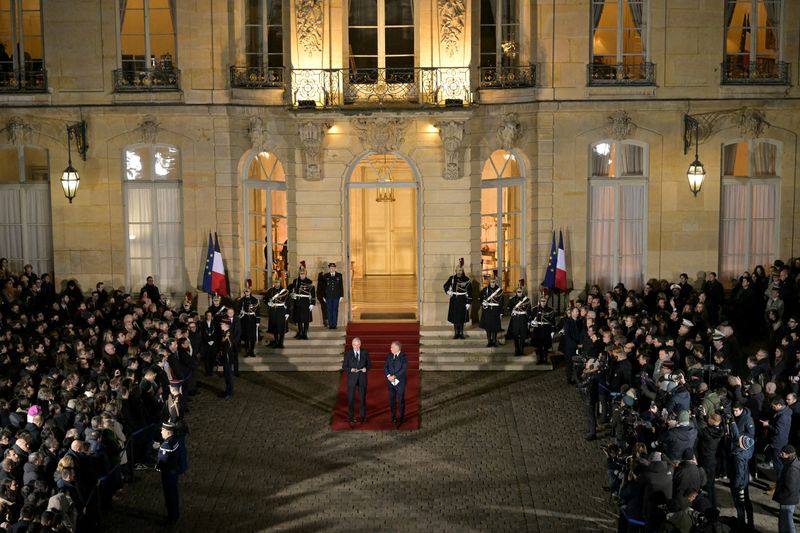
Written by Michelle Rose
PARIS (Reuters) – When Francois Bayrou, France's new centrist prime minister, was education minister in the 1990s, his plan to increase support for private schools led to protests across the country. He quickly surrendered and remained in office for another four years.
Three decades later, he will face a different force in the form of a fractured and divided parliament where one of his first tasks – as President Emmanuel Macron's fourth prime minister of the year – will be to pass a 2025 budget.
First, he must name a government that, like that of his predecessor Michel Barnier, will have the support of a minority in parliament and will be vulnerable to attack from far-right and left-wing opponents.
The ouster of Barnier and his government – the first time the French parliament has voted to dismiss a government since 1962 – appears to have stunned even those behind the move. Right now, there is cross-party support for emergency legislation to ensure government funding does not dry up, but then the hard work on next year's budget will begin.
“The difficulties are still the same as they were during the era of Michel Barnier,” Arnaud Benedetti, a professor at the Sorbonne University, told Reuters. “At the very least, a no-confidence motion does not seem likely in the very short term.”
A Macron aide said Bayrou is “the most consensual candidate who can bring people together.” Socialists said it represented more of the same.
Bayrou, a 73-year-old career politician, was the torchbearer of centrism until Macron reshaped the political landscape in 2017, blowing up the traditional mainstream parties in a campaign that Bayrou supported.
Bayrou has in the past been vocal about the risks posed by France's growing debt pile.
He did so again on Friday, saying the country's debt is as much a “moral problem” as it is a financial problem. “I heard your warning about the seriousness of the situation and I agree with that,” he told Barnier.
But he placed great importance on keeping the peace, whether with unions, legislators or France's myriad powerful vested interests.
However, maintaining peace in a National Assembly dominated by three warring factions will be nearly impossible.
Lawmakers' response to the 2025 budget bill led to Barnier's downfall, and left-wing leaders say they may try to oust Bayrou if he also uses special constitutional powers to pass the budget without a vote in parliament.
“Meeting opposition parties’ demands could be financially costly and the degree of fiscal consolidation may be limited next year as a result,” JPMorgan’s Rafael Brun Aguirre said in a note.
The far-right budget red lines remain in place
Throughout the week, Macron held talks with party leaders, ranging from center-right Republicans to the Communists.
He appealed to all “republican forces” to unite, but chose to resist the Socialist Party's calls to appoint a prime minister from among its ranks, not wanting to risk dismantling the reforms that had liberalized the euro zone's second-largest economy and made the pension system more financially sound. foot.
However, the pension reform approved by the president in 2023 will remain within the reach of his opponents.
“Our red lines still exist,” Jordan Bardella, leader of the far-right National Rally, told reporters shortly after Bairro was named. These red lines include linking pensions to inflation throughout 2025.
One poll this week showed that 35%-38% of voters intend to support Bardella's president, Marine Le Pen, in the next presidential election scheduled for 2027 – a level not seen before for the far-right leader and putting her in the lead. .
Moreover, even if Bayrou's political opponents do not stand in his way, the challenges facing his future government will be enormous.
It will need to reduce the budget deficit from the 6.1% projected for 2024 while keeping protest-prone trade unions at bay, increase Ukraine's military spending and find ways to support its struggling industrial sector.
Barnier had promised to reduce the deficit by raising taxes on the wealthy and big corporations, as well as imposing limits on the planned increase in pension payments. But these measures fell by the wayside when his government was overthrown.

Former Finance Minister Bruno Le Maire, who has been grilled by lawmakers investigating his role in France's failure to rein in its deficit, made a scathing accusation against Parliament.
“This council imposes taxes, spends, and imposes oversight,” he said. “I have long since lost any sense of economic and budgetary reality.”







